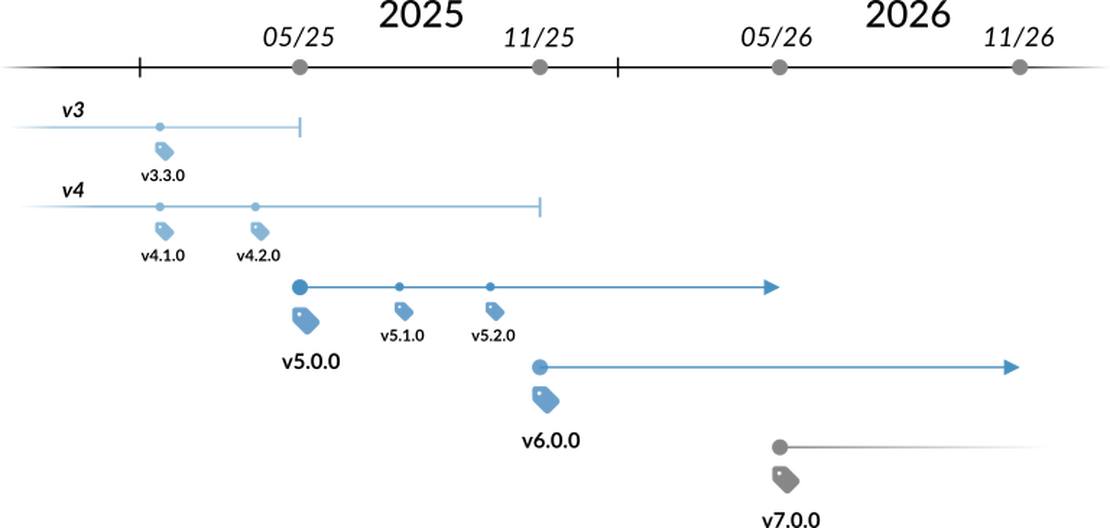Release Cycle
Upcoming versions
Major versions of Slurm-web are published following a six months release cycle, with releases planned in May and November every years. All major versions include new major features. Intermediate minor versions can be released as needed to publish bug fixes and minor features.


Business Model
How is Slurm-web development financed?
Slurm-web is a free software (GPLv3) without licence fee. Rackslab strongly believes in this model in which everyone can use Slurm-web regardless of their situation. However, Slurm-web development cannot happen without funding from some organizations. This is truly essential to make this software project sustainable and durable.
If your team wishes new features in Slurm-web (either listed in backlog below or any other of your choice), your organization can order its development to Rackslab. You will have the opportunity to take part of its specifications to match your needs. This will also secure its integration and delivery in the next major release.
Want to participate? Tell us your needs!
Contact us Contact usBacklog
Features Ideas
Users jobs permission
Add action in RBAC authorization policy for users to view only their own jobs.
#259Coordinators permission
Add action in RBAC authorization policy for coordinators to view jobs of their accounts.
#260Gantt chart of jobs
Visualization of jobs on resources with a Gantt chart including past, current and future jobs.
#261History of node events
Display the history of events that occurred on compute nodes (ex: node, resumed, etc…).
#263Basic reporting
Generate reports of global cluster usage per day/week/month and usage per association on the same periods.
#264Docker/Podman/OCI containers
Build and distribute containers to deploy Slurm-web easily in Kubernetes or any compatible environments.
#266Customizable dashboard
Collection of predefined widgets to display in a custom layout in Slurm-web dashboard.
#267SSO authentication
Support SSO authentication with OIDC/Oauth2 with common providers such as Authentik and Keycloak.
#268Real-time updates with SSE
Faster near real-time updates from Slurm based on Server Sent Events (SSE) to get instant notifications.
#269Node state control
Change node state (drain, resume, etc…) directly from web interface with dedicated permissions.
#270Jobs arrays support
Specific display for jobs arrays to easily navigate between the jobs in the same collection.
#271Scheduling statistics
Ergonomic display of Slurm scheduling statistics (similarly to sdiag) with built-in help messages.
Advanced reporting
Metrics and charts based Slurm jobs completions reported in analytics databases (Elastic, OpenSearch or ClickHouse).
#273Fairshare support
Display users and accounts shares, usage and current fairshare factor with built-in help messages.
#276Advanced reservations management
Support creation, modification and deletion of advanced reservations in Slurm.
#277SELinux support
Install finely tuned SELinux file labels in Slurm-web packages with necessary changes in SELinux policy.
#279Live job output
Display processes output in job details page with live update for running jobs.
#280Batch job submission
Give users the possibility to submit jobs from the web interfaces based on templates defined by developers.
#281Heterogeneous jobs support
Specific display for heterogenous jobs to easily navigate between the various jobs components.
#283QOS management
Create, modify and remove QOS in Slurm accounting service with ergonomic and intuitive forms.
#284Accounts/users management
Create, modify and remove accounts and users associations with dedicated permissions.
#285Internationalization
Support any foreign languages in the web interface for more accessibility.
#286Job centric metrics of resources usage
Monitor actual resources usage of processes in job allocations with intuitive charts.
#2883D representations of clusters
Advanced graphical 3D representations of clusters resources based on WebGL.
#289Power consumption monitoring
Visualize and monitor power consumption of jobs and nodes in the web interface.
#290Custom node status colors
Define custom color palette to represent nodes states with their allocations.
#291Decrease job priority with nice
Let users decrease the priority of some of their jobs with nice factor in order to favor other jobs in queue.
#294Explain job pending reason
Provide full text explanation of jobs pending reasons to clearly understand why jobs are not running.
#298Licenses resources monitoring
Display number of available licenses and distribution of licenses allocated to jobs.
#299List of completed jobs
Get the list of completed jobs with their return code over the past hours or days.
#325Done
Integrated Features
JWT authentication
User authentication with JSON Web Tokens (JWT) between Slurm-web components.
v3.0.0LDAP authentication
Initial user authentication with enterprise LDAP directory and advanced RFC 2307 bis schema support (FreeIPA, Active Directory, OpenLDAP, etc…).
v3.0.0RBAC permission management
Mechanism to manage permission with RBAC authorization policy.
v3.0.0Caching with Redis
Implement transparent caching in agent to limit requests sent to Slurm with Redis in-memory database.
v3.0.0Reactive frontend application
Modern reactive UI with frontend application based on VueJS framework.
v3.0.0Dashboard with Metrics
Home dashboard with some basic stats and metrics to get quick overview of current state and operation.
v3.0.0Jobs queue with paging
Display list of jobs queued in Slurm with paging to navigate easily in 1000+ jobs.
v3.0.0Jobs sorting
Sort jobs by multiple criteria (ID, user, state, priority) in both ascending and descending orders.
v3.0.0Jobs filtering
Filter jobs queue by state, users, accounts, QOS and partition to easily observe specific workflow.
v3.0.0Job details page
Display all jobs details (allocated resources, submit line, exit code, etc…) with possibility to access terminated jobs.
v3.0.0Nodes list
Display list of computes nodes with partitions and current status in Slurm.
v3.0.0Nodes filtering
Filter nodes by state and partition in order to easily spot nodes failures.
v3.0.0Node details page
Page to display all nodes information (OS, status, failure reason) in a visual and ergonomic format.
v3.0.0Visualization of racks
Advanced graphical representation of compute nodes in datacenter racks with their status in Slurm.
v3.0.0QOS list
Display the list QOS defined in Slurm with all their settings and limits with help messages integrated in user interface.
v3.0.0Advanced reservations list
Display the list of advanced reservations defined in Slurm with their parameters (start, end, resources, users, accounts, tags, etc…)
v3.0.0Linux distributions packages
Build and distribute standard RPM/deb packages for easy installation and upgrade on the most common Linux distributions.
v3.0.0Display Slurm version on clusters
Report Slurm versions deployed on all configured clusters.
v3.2.0Custom service message
Possibility to display service message to give production information to users on login (maintenance, ongoing issues, etc…).
v4.0.0Prometheus exporter
Export endpoint with Slurm scheduling, jobs and nodes metrics to be consumed by Prometheus for external monitoring.
v4.0.0Time-series charts
Display charts of high-level metrics (nodes states, jobs queue) based on external time-series databases.
v4.0.0Display jobs exit status
Visual indicator of completed jobs exit code to quickly spot execution failures in jobs list.
v4.0.0List of jobs on nodes
List jobs currently running on current node in node details page.
v4.0.0Support slurmrestd on TCP/IP socket
In addition to Unix socket, support connection to slurmrestd on TCP/IP socket.
GPGPU support
List of GPGPU with their allocation and represent GPGPU in racks graphical representation.
v5.0.0Dark mode theme
User interface theme with dark colors to reduce brightness.
v5.0.0Cache statistics and metrics
Insightful metrics and statistics to provide visibility on cache efficiency and Slurm load.
v5.1.0Cache statistics reset
Way to reset cache statistics, giving administrators better control over monitoring cache performance.
v5.2.0Visualization of allocated cores
Graphical representation of allocated cores to visualize jobs distribution.
v5.2.0Node names in racks visualizations
Display nodes names in racks graphical representations provided enough room for the label.
v5.2.0Users and accounts list
Display the list of users and account tree with all their parameters and limits.
v6.0.0Hosting under subdirectory
Support hosting of web interface in a subdirectory on a web server shared with other web applications.
v6.0.0